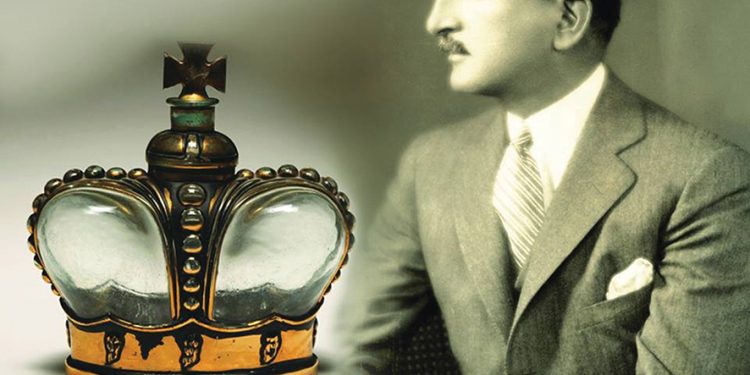In 1955, in the USA, the number of the first (1921-1939) and second (1945-1950) stream of Georgian emigrants did not exceed 300, however, this small diaspora was to have an important impact on the military and civil life of America. Renowned Georgians are responsible for influencing five fields in America in particular: Giorgi Kobakhidze (George Kobi) – the glass industry and glass Christmas tree ornaments; Alexandre Kartvelishvili (Alexander Kartveli) – the air force; Giorgi Balanchivadze (George Balanchini) – ballet; Giorgi Machabeli (Prince Machabeli) – perfumery.
In Georgia’s struggle for independence, Giorgi Machabeli revealed a wonderful gift and ability to perform the most dangerous and difficult tasks., traveling boldly from one country to another, negotiating with both government and revolutionaries, and making a great impression on all.
He was in Belgium when World War I began. He showed the liberation plan of Georgia to Governor General von Der Holtz, and intrigued him to such an extent that he was sent to Mikhako Tsereteli by car, after which both went to Berlin to join the Georgian Independence Committee from Geneva.
In 1922, Giorgi decided to settle in America. Two years later, in New York, he opened antiques shop ‘The Red and the Black’ and soon won acclaim. In parallel, he worked on an old hobby of his – perfumery, and, on finding that his clients were more interested in his perfumes than his antiques, he gave up the shop, and in 1926 opened his own company which created and packaged perfumes and designed the advertisements. Within four years, the perfumery was prestigious.
It is difficult to say which perfume of Giorgi Machabeli’s was most successful, but the use of the gold gilded Royal crown taken from Machabeli’s own family emblem, chosen to decorate the perfume bottles, was a lucky choice. The perfume ‘The Queen of Georgia’ particularly inspired American society. Soon, this was followed by the perfume ‘The Princess Norina’ dedicated to his wife, the perfume ‘Duchess of York’ named after the English beauty, ‘The Golden Autumn’, ‘The Bathroom Oil’, ‘The Bath-House’, the eau-de-cologne ‘The Song of the Wind’, and pressed powder and lipstick. All were beautified by the ‘Crown of Prince Machabeli’.
The fine publicity announcements made up by Machabeli are wonderful proof of his genius.
“‘The Bath-House’ oil by Prince Machabeli, poured in a small quantity into warm water, will bring you pure pleasure. Let your body soak it up, and sink into the Eastern aroma. Find time for yourself to enjoy this luxury. It will heighten your mood, set you free from tiredness, caress you. In the evening, when you go somewhere, know you’ll be surrounded by its magic aura ($1.50).”
“‘The Golden Autumn’ perfume by Prince Machabeli is a very modern, delightful fragrance with a hint of ginger. If you wish to be as good as its name, spray it proudly and with pleasure. It will guarantee something wonderful. Place some drops on your wrists, elbows, at your neck, and behind your ears. Follow these rules of use to guarantee a good fragrance ($4.00).”
Machabeli’s perfume bottles were first made of porcelain, then at George Kobi’s glass company they made the now renowned glass bottle, which, as the encyclopedic reference book remarked: ‘is considered to be the best handmade specimen of a glass bottle of perfume’. It was made in a half-automated way, as the gilding with gold, the preparing of the golden incision and the laces were made by hand.
Soon, Machabeli had spread his ‘Machabeli Crown’ all over America. His enterprise overcame the crisis of 1930 and placed him among the front-ranking businessmen.
The first workers of the firm were his friends, the refugee aristocrats, their wives and daughters. It was a team of noble working personnel.
Within 10 years, Giorgi Machabeli had made not only a million-dollar business from a mere hobby, but had become an innovator as well, as America had no perfumery industry of its own until he arrived on the scene. Before the Machabeli enterprise, bad copies of French production were the norm – and very expensive ones too. For most at the end of the century, simple scented flowers fastened to clothing were the only options. Thus, Machabeli, by means of his hobby, supplemented that gap in the market and greatly boosted the American perfumery industry.
Business did not prevent him from social activity, and he was among the initiators of founding the Georgian Association of Countrymen in the US in 1931. In 1933-1934, he was the chairman of this association, and from 1934, its treasurer. He attended to his duty and materially helped the association and all Georgians in need, while ambitiously seeking to create new business and pave the way to the world market. “His second aim is to get involved in the Georgian political struggle for independence, with his friends,” wrote Spiridon Kedia.
In June 1935, he as all set to open a new, elegant exhibition hall. He invited the best decorator, the British painter Secil Betin, and photographer Pavel Chelishev, but sadly it was a project he never got to see finished: In March that year, on a trip from California to Shanghai, he caught a cold which led to pneumonia. Such illnesses were generally treatable at the time, but nonetheless, Machabeli passed a week later.
The firm ‘Prince Machabeli’ still exists today, in Connecticut, still a worthy competitor of world famous perfumery firms. The production is issued with the name of its founder, and it still bears the emblem created by Giorgi Machabeli, the Georgian royal golden crown, which happens to also be the emblem of the ‘Giorgi Machabeli Fund’ recently founded in Tbilisi.
* Ketevan Tukhareli’s English Translation of Rusudan Daushvili’s Georgian article (The journal ‘Historiani’)
Translated by Ketevan Tukhareli*














